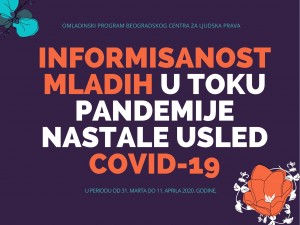 The BCHR’s Youth Programme conducted an online survey on how well informed young people were about the situation in the country during the state of emergency imposed in response to the COVID-19. The survey was conducted within the “On an Isolated Youth” campaign in the 31 March – 11 April 2020 period. The respondents were asked to fill a questionnaire on how well they were informed about the situation in Serbia and most of the world and on their mental health and support and solidarity among youths.
The BCHR’s Youth Programme conducted an online survey on how well informed young people were about the situation in the country during the state of emergency imposed in response to the COVID-19. The survey was conducted within the “On an Isolated Youth” campaign in the 31 March – 11 April 2020 period. The respondents were asked to fill a questionnaire on how well they were informed about the situation in Serbia and most of the world and on their mental health and support and solidarity among youths.
The survey results showed that over half (57.4%) of the youths thought that they were well-informed about the situation caused by the COVID-19 pandemic. As many are 25.6% of the respondents thought that there was an overload of information and that they were too well-informed, 13.8% rated their knowledge as middling, while only 1% believed they were insufficiently informed about the situation. Another 1% said that they did not want to be informed of this topic at all.
Most young people (75.4%) got their information from through Internet portals, and TV and social media. A much smaller number of respondents informed themselves by reading the newspapers or listening to the radio. As far as social media are concerned, they equally followed posts on Instagram, mostly by Instagram influencers, and on Facebook, and, to a lesser extent, on YouTube and Reddit; the fewest informed themselves via Twitter. Among the respondents who got their information from TV, 47.6% said they informed themselves by watching cable TV station N1 and 33.3% said they watched the national service broadcaster RTS, while the rest watched other stations.
The survey also showed that only 8.7% of the youths fully believed their sources of information and that as many as 83% did not fully trust the information on the pandemic published by them. Youths were not very trustful of the experts’ views and opinions, or the information they heard at the regular daily press conferences in Serbia. They did, however, visit portals of renowned and eminent organisations and institutions, for the most part the websites of the World Health Organization, World meters/Covid 19 and covid-19.rs. Respondents who got their information from foreign media mostly read reports published by the BBC, the New York Times and the Guardian, Al Jazeera and CNN.
The survey was conducted by an online questionnaire including both open and closed questions. The questionnaire was filled by youths aged 15-30. The 19 questions were divided in three parts: Level of Information, Mental Health and Youth to Youth. The respondents’ answers were collected electronically from 31 March to 11 April 2020 and the data were then processed and analysed. The results on the other two topics will be published soon.
The “On an Isolated Youth” campaign is implemented with the support of the UN Human Rights Team.







